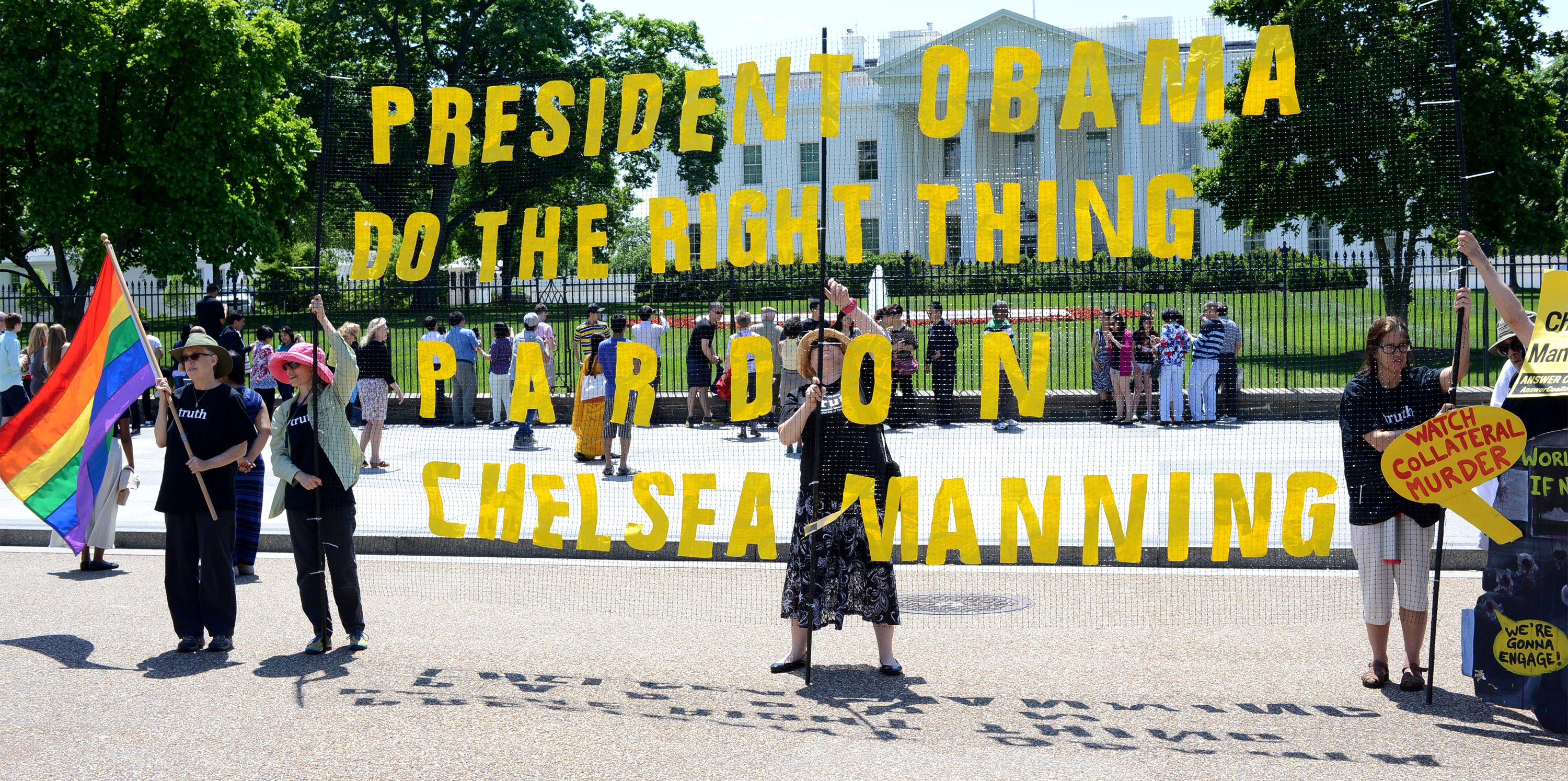Chelsea Manning: At the Intersection of Security, Civil Liberties, and Human Rights
 https://flic.kr/p/nkbTiX
"Pardon Chelsea Manning Rally" in Washington D.C.
https://flic.kr/p/nkbTiX
"Pardon Chelsea Manning Rally" in Washington D.C.
While the Trump administration has seen many substantive executive decisions being made within his first few days in office, many in America are still reeling from the ones that President Obama made in his last few days. One decision in particular that has rocked the boat in terms of interlinking issues surrounding national security, as well as human rights, was the commutation of the sentence of Chelsea Manning.
Manning is a former military intelligence analyst in Iraq, but is better known for being a whistleblower, who leaked 700 000 documents regarding US policies in Iraq and Afghanistan. Through the platform of WikiLeaks, the documents were released by various media sources, and as a result, Manning was sentenced to 35 years in prison, the longest sentence any whistleblower has received in recent history.

“Pardon Chelsea Manning Rally” in Washington D.C.
On Wednesday, January 18th, 2017, Obama announced that he would be commuting Manning’s sentence, as he believed it was very disproportional “to what other leakers have received” and that he felt that justice had been served. Manning will be released from prison on May 17th, 2017, instead of her scheduled release in 2045.
Politicians from both sides of the aisle have spoken out against Manning’s actions. Hillary Clinton stated that Manning’s actions “tore at the fabric of government” and pledged to take aggressive steps to hold Manning accountable to her actions. More recently, upon the commutation of her sentence, President Donald Trump tweeted that Manning was “an ungrateful traitor” and that Obama was a “weak leader” for his actions.
Manning’s case was also at the centre of many human rights controversies, most notably because Manning identifies as a transgender woman, and had been imprisoned in a men’s correctional facility, where she tried to commit suicide on several occasions, spent lengthy periods of time in solitary confinement, and faced many barriers in obtaining proper medical treatment.
While Manning is set to walk free, and according to Obama’s opinion, justice has been served, there are still many loose ends to be tied up in this landmark decision.

One issue that has come under scrutiny is the impact that Manning’s commutation will have on other whistleblowers. Manning’s case has been compared, most notably, to the case of Edward Snowden. While many feel that Manning’s clemency has set the grounds for the pardon of Snowden, there are many notable differences between their two respective cases.
One of the most glaring factors for justifying pardoning Manning, but not Snowden, was the fact that Manning went through the criminal justice system, served time, and did indeed acknowledge that her actions constituted some wrongdoing through this process. Snowden, on the other hand, fled the country, and now resides in Russia, a country that has come under fire for claims of tampering with US elections, and, as former White House Press Secretary Josh Earnest has stated “made a concerted effort to undermine confidence in our democracy.” Snowden did express his approval of Manning’s pardon through Twitter, however Obama did not make the effort to grant Snowden clemency during his final days in office. When looking towards the future, Trump has expressed his disdain for Snowden’s actions in the past (again, through the platform of Twitter), but due to Trump’s seemingly close relationship with Putin, there is much to speculate about how, if at all, Trump will proceed with Snowden’s case in the future. There are also key differences in the nature of Manning and Snowden’s respective leaks. While Manning leaked many documents that were about cases in specific US military operations that had happened, but been either covered up or misrepresented by the government, Snowden exposed ongoing surveillance processes at a larger national level. These differences could provide insight as to why Obama did not use his clemency powers to pardon Snowden as well. However, many human rights activists are still advocating for the pardon of Snowden, despite these obvious differences, on the grounds that Snowden’s actions benefitted civil liberties.
Manning’s case is also of interest because of her specific venue of publishing the leaks. Manning used WikiLeaks after being turned down by many other news organizations, and the information from WikiLeaks was then picked up by journalistic organizations. While President Trump has expressed his disapproval of Manning’s pardon, Trump has also recently been relying on and repeating the information provided by WikiLeaks founder Julian Assange. Specifically, regarding claims from Assange that Russia did not have anything to do with incidences during the election, such as the hacked DNC emails. This has created a rift between Trump and high ranking members of the Republican party, who believe that Trump is putting his faith in WikiLeaks rather than the US’s own intelligence officials.
Manning’s case is also a human rights issue on two fronts: on the one hand, it is a representation of the mistreatment of those within the LGBTQ+ community, and Manning’s commutation is one that many human rights activists feel has come too little, too late. On the other hand, it also speaks to the issue of journalism and free speech. In 2013, Obama and Attorney General Eric Holder revised processes for investigating leaks, on the grounds that Obama felt the way these investigations were conducted could possibly “chill the investigative journalism that holds government accountable”, and that journalists should not be at legal risk for doing their jobs. However, in light of these changes, Obama still chose to wait almost four more years to commute Manning’s sentence.
The case of Chelsea Manning is not an easy one to parse through, and is clearly at the intersection of a number of hot button issues, such as free speech, human rights, national security, and civil liberties. Interestingly enough, these are issues that President Trump and his administration have showed trends towards reversing the progress that Obama’s administration made on these issues. Perhaps the commutation of Chelsea Manning’s sentence in the last days of the Obama administration was strategic and timely. In the face of the impending Trump administration, Manning’s pardon helps to ensure that the issues at play are ones that are still being discussed, debated, and advocated for, even as the administration makes moves that push against these values.
